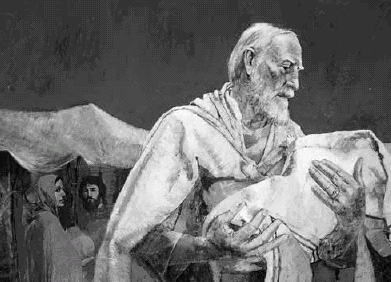 . . .sorry for the infrequency of my posts lately. . .
. . .sorry for the infrequency of my posts lately. . .
8 years ago
 "And this is the reason why our theology is certain: it snatches us away from ourselves and places us outside ourselves, so that we depend not on our own strength, conscience, mind, person, or works but on what is outside us, that is, on the promise and truth of God, which cannot deceive." ------Martin Luther
"And this is the reason why our theology is certain: it snatches us away from ourselves and places us outside ourselves, so that we depend not on our own strength, conscience, mind, person, or works but on what is outside us, that is, on the promise and truth of God, which cannot deceive." ------Martin Luther "I have sometimes thought," said Catherine, doubtingly, "whether ladies do write so much better letters than gentelmen! That is--I should not think the superiority was always on our side."
"I have sometimes thought," said Catherine, doubtingly, "whether ladies do write so much better letters than gentelmen! That is--I should not think the superiority was always on our side." "Luther also discovers this kind of performative word in the sacraments of Baptism and the Lord's Supper, as well as in the Christmas story ("To you is born this day a Savior!"), the Easter story, and many other biblical passages. As we have said before, he regards these sentences as promises (promissiones). They are the concrete way in which Christ is present, and his presence with us is clear and certain: it clearly liberates us and makes us certain. I cannot remind myself of this freedom and certainty in isolation; I cannot have a monologue with myself. These gifts are given and received only by means of the promise spoken by another person (and not only by the official priest or preacher), who addresses it to me in the name of Jesus. I cannot speak the promise to myself. It must be spoken to me. For only in this way is it true. Only in this way does it give freedom and certainty.
"Luther also discovers this kind of performative word in the sacraments of Baptism and the Lord's Supper, as well as in the Christmas story ("To you is born this day a Savior!"), the Easter story, and many other biblical passages. As we have said before, he regards these sentences as promises (promissiones). They are the concrete way in which Christ is present, and his presence with us is clear and certain: it clearly liberates us and makes us certain. I cannot remind myself of this freedom and certainty in isolation; I cannot have a monologue with myself. These gifts are given and received only by means of the promise spoken by another person (and not only by the official priest or preacher), who addresses it to me in the name of Jesus. I cannot speak the promise to myself. It must be spoken to me. For only in this way is it true. Only in this way does it give freedom and certainty. "What this certainty is all about is clear from a short passage in the Lectures on Genesis that Luther virtually offers as a theological legacy: "I have been baptized. I have been absolved. In this faith I will die. No matter what trials and problems confront me, I will not waver in the least. For he who said: 'The one who believes and is baptized will be saved' (Mark 16:16), and 'whatever you loose on earth will be loosed in heaven' (Matt. 16:19), and 'this is my body; this is my blood which is shed for you for the forgiveness of sins' (cf. Matt. 26:26,28), cannot lie or deceive. This is certainly true." In the Lectures on Galatians (1535) Luther writes, "And this is the reason why our theology is certain: it snatches us away from ourselves and places us outside ourselves (nos extra nos), so that we depend not on our own strength, conscience, mind, person, or works but on what is outside ourselves (extra nos), that is, on the promise and truth of God, which cannot deceive.""
"What this certainty is all about is clear from a short passage in the Lectures on Genesis that Luther virtually offers as a theological legacy: "I have been baptized. I have been absolved. In this faith I will die. No matter what trials and problems confront me, I will not waver in the least. For he who said: 'The one who believes and is baptized will be saved' (Mark 16:16), and 'whatever you loose on earth will be loosed in heaven' (Matt. 16:19), and 'this is my body; this is my blood which is shed for you for the forgiveness of sins' (cf. Matt. 26:26,28), cannot lie or deceive. This is certainly true." In the Lectures on Galatians (1535) Luther writes, "And this is the reason why our theology is certain: it snatches us away from ourselves and places us outside ourselves (nos extra nos), so that we depend not on our own strength, conscience, mind, person, or works but on what is outside ourselves (extra nos), that is, on the promise and truth of God, which cannot deceive."" I thought this bit from Oswald Bayer's, Theology the Lutheran Way, went well with my previous post, Faith and the Promises of God. In it Bayer affirms the basic structure of a proper relationship before God, that is, in God's self-giving through the Word of promise and our receiving through the open hands of faith. This is what Bayer calls the vita passiva, the receptive life.
I thought this bit from Oswald Bayer's, Theology the Lutheran Way, went well with my previous post, Faith and the Promises of God. In it Bayer affirms the basic structure of a proper relationship before God, that is, in God's self-giving through the Word of promise and our receiving through the open hands of faith. This is what Bayer calls the vita passiva, the receptive life. From what we read below, in my post Faith, Healing, Prayer, and Miracles in the Gospels, we see a few things that stick out:
From what we read below, in my post Faith, Healing, Prayer, and Miracles in the Gospels, we see a few things that stick out:
 Jesus also tells us, "All things, whatever you ask, praying, believe that you will receive, and it will be to you" (Mark 11:24; cf. Matt. 21:22). As James (and James 8^j) reminds us, "If any of you lacks wisdom, let him ask God, who gives generously to all without reproach, and it will be given him. But let him ask in faith, with no doubting, for the one who doubts is like a wave of the sea that is driven and tossed by the wind. For that person must not suppose that he will receive anything from the Lord; he is a double-minded man, unstable in all his ways" (1:5-8).
Jesus also tells us, "All things, whatever you ask, praying, believe that you will receive, and it will be to you" (Mark 11:24; cf. Matt. 21:22). As James (and James 8^j) reminds us, "If any of you lacks wisdom, let him ask God, who gives generously to all without reproach, and it will be given him. But let him ask in faith, with no doubting, for the one who doubts is like a wave of the sea that is driven and tossed by the wind. For that person must not suppose that he will receive anything from the Lord; he is a double-minded man, unstable in all his ways" (1:5-8). All of these questions, though, miss the point. They also miss the point of, why faith? They are questions that are focussed on me, not on God and his promises.
All of these questions, though, miss the point. They also miss the point of, why faith? They are questions that are focussed on me, not on God and his promises. their lot-- all they had was a promise of a man who was healing the sick.
their lot-- all they had was a promise of a man who was healing the sick. I want to address the understanding of "faith" in the Gospels, as portrayed by Jesus. It is something I have pondered before and I thought it would be a good thing to address, especially within the Lutheran tradition. This is somewhat stimulated by some discussions on the Wittenberg Trail, one on prayer and the other on faith-healing. At first glance it would seem that the understanding of faith in the Gospels is not consistent with a Pauline understanding, and by extension, a Lutheran understanding. There is such an overwhelming pattern in the Gospel use of the term that it cannot be ignored and must be incorporated and explained within a Lutheran context. What one finds is that faith is almost always used in connection with healing, miracles, casting out demons, and prayer. This post will just give all the examples of this playing out. I will leave my analysis for another post.
I want to address the understanding of "faith" in the Gospels, as portrayed by Jesus. It is something I have pondered before and I thought it would be a good thing to address, especially within the Lutheran tradition. This is somewhat stimulated by some discussions on the Wittenberg Trail, one on prayer and the other on faith-healing. At first glance it would seem that the understanding of faith in the Gospels is not consistent with a Pauline understanding, and by extension, a Lutheran understanding. There is such an overwhelming pattern in the Gospel use of the term that it cannot be ignored and must be incorporated and explained within a Lutheran context. What one finds is that faith is almost always used in connection with healing, miracles, casting out demons, and prayer. This post will just give all the examples of this playing out. I will leave my analysis for another post. 
 Mar 10:52 And Jesus said to him, Go, your faith has healed you. And instantly he saw again, and followed Jesus in the highway.
Mar 10:52 And Jesus said to him, Go, your faith has healed you. And instantly he saw again, and followed Jesus in the highway. An amusing narrative interjection by Jane Austen in Northanger Abbey (1818), with equally amusing evidence, validating this observation, from the pages of Tolstoy's Anna Karenina:
An amusing narrative interjection by Jane Austen in Northanger Abbey (1818), with equally amusing evidence, validating this observation, from the pages of Tolstoy's Anna Karenina: